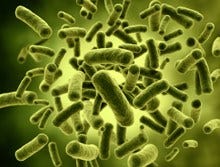Microbiomes Gain Momentum in Indiana’s Life Sciences
 Scientists say microbiomes outnumber cells in the human body 10 to one. (Photo courtesy: National Institutes of Health)
Scientists say microbiomes outnumber cells in the human body 10 to one. (Photo courtesy: National Institutes of Health)
Subscriber Benefit
As a subscriber you can listen to articles at work, in the car, or while you work out. Subscribe NowFor those outside the field of science, it’s likely the grocery’s yogurt aisle is the only place they’ve encountered the term “microbe.” Indeed, microbiomes are a relatively new area of the life sciences, but they’re quickly gaining traction, and Indiana life sciences leaders believe the state is uniquely positioned to drive the microbiome business far beyond the dairy aisle.
Microbiomes are defined as the microorganisms in a particular environment, including the body or a part of the body. The area of study encompasses human, animal, environmental and plant science, and its tendrils reach into every nook and cranny of Indiana’s life sciences landscape.
Microbiomes were the focus of a recent Frameworx event, hosted by the state’s life sciences initiative BioCrossroads. Indiana Biosciences Research Institute President and Chief Executive Officer David Broecker says the state’s eclectic life sciences landscape—which includes “one of everything”—is increasing its focus on microbiomes.
“When you look across the life sciences, whether your work is in plant science innovation, pharmaceutical human therapeutics, diagnostics or animal health—every one of those companies is interested in the interaction between their line of work and the microbiome,” says Broecker. “It’s so critical in understanding what causes disease and where the opportunities are for innovations.”
The depth of the field is staggering; microbiomes outnumber cells in the human body 10 to one, and experts believe up to 90 percent of all disease can be traced in some way back to the gut and health of the microbiome. Many believe scientists are only in the early stages of understanding the microbiome. Underscoring the emergent nature of the field, the Human Microbiome Project is among the National Institute of Health’s newest programs, launched in 2008.
Now with “lots of money, lots of research and lots of publications” centered on the topic, Broecker says microbiomes are, likewise, changing how Hoosier life sciences companies do business. Leaders at Indianapolis-based Eli Lilly and Company say increasing knowledge of microbiomes is changing how the pharmaceutical giant develops drugs. Lilly Research Laboratories Global Lead for External Innovation Dr. Gary Krishnan says the company first approached the field as “a skeptic.”
“To us, the microbiome seemed like a sort of fad; there’s a lot of hype, a lot of work going on around it, and we were in the watchful waiting mode,” says Krishnan. “We’re beginning to appreciate the role of the microbiome, the byproducts of the microbiome as it applies to skin integrity, gut barrier integrity and how this impacts various diseases and products that we’re going to launch.”
Krishnan says Lilly now has “a huge investment” in understanding how the microbiome impacts health and is focusing on two areas: diabetes and immunology, the branch of medicine concerned with immunity.
“This is an emerging field,” says Krishnan. “This is, in my opinion, the early days. But Lilly has always been incredibly good at watchful waiting and striking when we are most knowledgeable and feel the most comfortable.”
Broecker believes Indiana’s diverse life sciences landscape has the potential to give birth to “transdisciplinary” enabling technologies.
“The question is, how do you bring the right people together to share what they know to solve big problems,” says Broecker. “This is a growing area in terms of the technology; you need to do great science, and it needs to somehow become protectable to the point where it makes sense to invest money in it.”
In addition to established players such as Lilly and Dow AgroSciences, Carmel-based startup Assembly Biosciences Inc. is gaining momentum. The company is developing a microbiome technology to treat Clostridium difficile infection (CDI), which could also lead to therapeutics for inflammatory bowel disease (IBD) and irritable bowel syndrome (IBS).
“Assembly is leading the way in some of the things that they’re doing, so I hope other [startups] will follow,” says Broecker. “It’s a big area of opportunity and focus for Indiana.”
